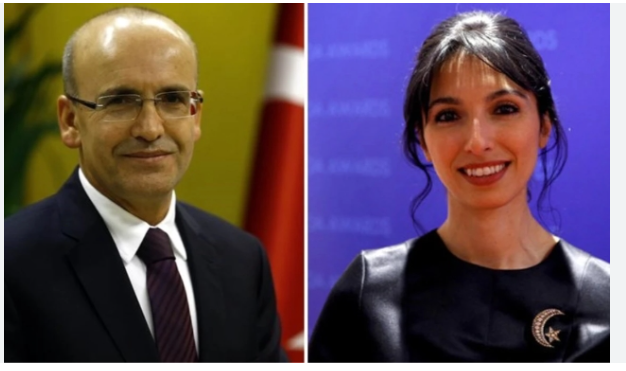Turkish President Recep Tayyip Erdogan on Wednesday appeared to make a crucial shift regarding the future of his inflation-ridden country’s monetary policy.
Erdogan said he would accede to his new finance minister’s outlook on interest rates in Turkey, meaning a return to economic orthodoxy after years of heavy state control over the central bank and refusing to raise interest rates despite soaring inflation, reported CNBC.com.
Newly appointed Finance and Treasury Minister Mehmet Simsek, who previously served as deputy prime minister and finance minister between 2009 and 2018, is widely respected by investors. Economists and analysts see Simsek as someone who can turn the tide in Turkey’s cost-of-living crisis, which has seen the Turkish lira’s value against the dollar fall some 80% in the last five years.
“Some of our friends should not be mistaken, such as (asking), ‘Is our president going for a serious change in interest rate policies?’” Erdogan told the press on Tuesday, according to a Reuters translation of Turkish media published Wednesday. The president was referring to his opposition to raising interest rates, which he said was not changed.
“But upon the thinking of our treasury and finance minister,” Erdogan added, “we have accepted that he will take steps swiftly, comfortably with the central bank.”
Erdogan has long declared himself a staunch opponent of interest rates, refusing to raise them even as inflation in late 2022 topped an eye-watering 85%, insisting that any hikes would harm the economy. Economists and critics say his policies have continued to hurt the lira and push inflation up, fomenting a currency crisis.
Inflation in the country of 85 million was up by 46.62% in May year on year, the same month in which Erdogan was reelected as president to enter his third decade in power. Some economists predicted a collapse in the lira if Erdogan continued his current path of unorthodox monetary policy, which sent many foreign investors running for the hills in the last few years.
The appointment in early June of Simsek engendered some confidence in investors.
“It looks like Erdogan has given Simsek a mandate to hike [rates]. That is positive,” Timothy Ash, emerging markets strategist at BlueBay Asset Management, told CNBC on Wednesday. “Clearly he says he does not agree with orthodox monetary policy but is willing to back Simsek for the time being.”

Hafize Gaye Erkan replaces Sahap Kavcioglu at the Central Bank
Erdogan also appointed Hafize Gaye Erkan as Turkey’s new central bank governor. Erkan and Simsek together may lead to serious fiscal and monetary changes that would initially have to be painful, Goldman Sachs predicted in a research note.
A “fully orthodox policy-maker” would let the exchange rate adjust on its own and significantly raise interest rates, wrote Clemens Grafe, an economist at Goldman.

“In our view, this suggests that an orthodox policy-maker would raise rates to 40%, the current level of deposit rates,” he said, adding that once inflation stabilized, the country’s key interest rates could be brought down to around 25% by the end of the year. Turkey’s current interest rate sits at 8.5%.
Many are still skeptical, however, that Erdogan will truly relinquish his hold over the actions of the central bank. Within a few months of 2021 alone, Erdogan fired four high-ranking central bank officials who did not espouse his economic thinking, and the incoming Erkan will be Turkey’s fifth central bank governor in just four years.
The mastermind of financial repression measures used to peg the currency at an artificially elevated level to win elections, and compel banks to bankroll government borrowing at negative real rates, former Central Bank governor Sahap Kavcioglu was moved to BRSA, where he can sabotage tight monetary policy with new macro-prudential regulations. Additionally, Erdogan has not sacked Erkan’s deputies or the discredited Monetary Policy Committee, suggesting the Simsek-Erkan duo would be under close surveillance with members of the old regime.
Orcun Selcuk, an assistant professor of political science at Luther College, does expect Erdogan to allow economic orthodoxy to take hold — with a particular view on eventual local elections.
“I think Erdogan is willing to calm down until the local elections,” Selcuk said. “He really wants to take back Istanbul and Ankara, where the economic crisis and higher cost of living are felt the most.”
Follow our English language YouTube videos @ REAL TURKEY: https://www.youtube.com/channel/UCKpFJB4GFiNkhmpVZQ_d9Rg
And content at Twitter: @AtillaEng
Facebook: Real Turkey Channel: https://www.facebook.com/realturkeychannel/